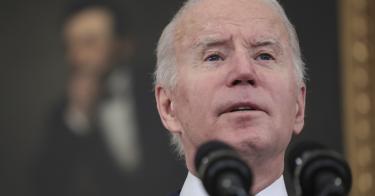The date was April 27, 2005, and then-senator Joe Biden (D., Del.) rose to give “one of the most important speeches . . . I will have given in the 32 years since I have been in the Senate.” The Republican majority was talking about abandoning the Senate’s tradition of extended debate. Doing so, Biden said, would “emasculate the Senate.”
Republicans did not take that leap in 2005, but Biden is urging Democrats to do so now. President Biden should listen to Senator Biden.
Senate rules require a supermajority (currently 60 votes) to end debate on a bill before a simple majority can pass it. A “filibuster” occurs when fewer than 60 Senators vote to end debate. As something of a legislative speed bump that empowers the minority and annoys the majority, extended debate has been, the Congressional Research Service says, one of the Senate’s “most distinctive procedural features” for more than two centuries.
The majority often complains that the vote threshold for ending debate is too high. Without any debate rule between 1806 and 1917, ending debate required 100 percent agreement. Senate Rule 22 set that threshold at two-thirds in 1917, and it has been three-fifths of the full Senate since 1975. Because changing the Senate’s most distinctive feature is such a serious matter, each change was made only after the formal process established in Senate rules produced a wide, bipartisan consensus.
>>> A Liberal Defense of the Filibuster
The “nuclear option” was invented so a simple majority of senators can still change how the Senate operates. This parliamentary gimmick leaves untouched what Senate rules say, but reinterprets what they mean. If that sounds familiar, it is akin to what the Supreme Court has often done with our written Constitution, what Justice George Sutherland in 1937 called “amendment in the guise of interpretation.” A simple majority simply adopts a reinterpretation of a rule that they lack the votes to actually change.
In his 2005 speech, Biden addressed both the goal of eliminating extended debate and using the nuclear option to achieve it. He made several compelling points that remain true today.
First, extended debate is about “the Senate’s proper role in our system of Government,” not about any particular bill. Quoting historian Robert Caro, author of Master of the Senate, Biden said that changing “the right of extended debate in the Senate” is not about “the particular dispute of the moment, but . . . the fundamental character of the Senate of the United States.”
Second, that fundamental character comes from how America’s founders designed the Senate. They made it a “different kind of legislative body” than those, like the House of Representatives and parliaments around the world, where even a slim majority has all the power. Extended debate, Biden said, is an important part of the “system of checks and balances” that prevents “the aggrandizement of power” in too few hands.
Third, this design makes the Senate a more “consensus body” by pushing the majority to work with the minority. “Extended debate,” Biden said, is “a means to reach a more modest and moderate result to achieve compromise and common ground.” Biden’s colleague, Senator Charles Schumer (D., N.Y.), agreed and acknowledged that extended debate “often makes better legislation.”
Fourth, using the nuclear option rather than the established process for amending the Senate’s rules so a narrow majority can make such a significant change will have grave consequences. It would, Biden said, “eviscerate the Senate” and “gut the very essence and core of what the Senate is about as an institution.”
Then-senator Barack Obama (D., Ill.) made the same point a few days earlier, arguing that “if the majority chooses to . . . change the rules and put an end to democratic debate, then the fighting, the bitterness, and the gridlock will only get worse.”
Biden also said that, by changing meaning but not language, the nuclear option “would send a terrible message about the malleability of Senate rules. No longer would they be the framework that each party works within.” Instead, Biden warned that there would be “nothing to stop a temporary majority from doing so whenever a particular rule would pose an obstacle.”
Finally, Biden pointed out that “[e]ven when the Senate’s rules have been changed in the past to limit extended debate, it has been done with great care, remarkable hesitancy, and by virtual consensus.” He was right. The Senate has set or changed the vote threshold for ending debate four times. Each time, a senator introduced a resolution to amend the debate rule, the Rules Committee held hearings, and the Senate extensively debated the issue.
>>> Biden Wants to, in His Words, “Eviscerate the Senate”
The Senate voted 76-3 to adopt the debate rule in 1917, 63-23 to lower the vote threshold in 1949, and 72-22 to change it again in 1959. That year is significant because the Senate also added that “[t]he rules of Senate shall continue from one Congress to the next Congress unless they are changed as provided in these rules.” The nuclear option, of course, would violate this command.
In 1975, the Senate once more lowered the threshold for ending debate to 60 percent of all Senators, but kept the threshold for changing Senate rules at two-thirds. Three decades later, in his 2005 speech, Biden admitted that he initially supported “jettisoning established Senate rules and ending debate on a rules change by a simple majority.” That position, he came to realize, was “misguided” and, in the end, “I and my colleagues . . . reversed ourselves and changed the cloture rule but only by following the rules.”
Biden said that eviscerating the Senate “to help in one political fight or another . . . would be disastrous.” A “current debate, over a particular set of issues,” he insisted, “should not be permitted to destroy what history has bestowed on us.” President Biden should listen to Senator Biden before it’s too late.
This piece originally appeared in The National Review



